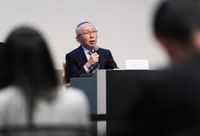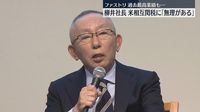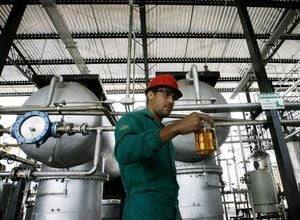Tadashi Yanai, the Chairman and CEO of Fast Retailing, which operates casual clothing stores like Uniqlo, expressed strong views on the Trump administration's tariff policies during an earnings briefing held on April 10, 2025. Yanai stated that "thinking calmly and rationally, such things don't work. I don't think it will last," referring to the mutual tariffs imposed by the U.S. administration.
The U.S. administration has announced a policy of suspending mutual tariffs for 90 days for countries and regions that seek to negotiate trade with the U.S. without initiating retaliatory tariffs. However, Yanai cautioned that this could lead to "a great disaster for surrounding countries." He emphasized that while it is permissible to impose tariffs, prioritizing only one's own country is not globally acceptable, stating, "It is bad for one's own country as well."
Fast Retailing's production strategy is primarily focused in Southeast Asia, where the risk of high tariffs is lower. Yanai noted, "Production areas can be changed as much as possible. There are no borders in the economy," highlighting the company's flexibility in adjusting its supply chain. This adaptability is crucial as the company navigates the complexities of international trade.
During the earnings briefing, Yanai announced that the consolidated earnings forecast for the fiscal year ending in August 2025 has been revised upward to 410 billion yen, marking a 10.2% increase from the previous year. This projection aims for a record high profit for the fifth consecutive year, demonstrating the company's resilience in a challenging economic environment.
Regarding the impact of Trump's tariffs on Fast Retailing, Yanai estimated that the effect on the group's overall business profit for the second half of the fiscal year would be approximately 2-3% if all announced tariff rates are applied without raising product prices. He noted that the impact on this year's earnings is limited due to a considerable amount of products already cleared through customs in the United States.
Fast Retailing's interim consolidated financial results for the fiscal year ending February 2025 showed a remarkable increase in revenue and profit. Sales revenue rose by 12.0% year-on-year to 1 trillion 790.1 billion yen, while final profit surged by 19.2% to 233.5 billion yen, both achieving record highs for an interim period. The company's North American operations, particularly in states like Texas and California, have seen significant increases in revenue and profit due to strong sales at new stores.
Yanai further elaborated on the implications of the tariff policies, stating, "It is unreasonable given the current international situation. It probably won't last." He underscored the established international division of labor, asserting that it is not feasible for the United States to claim all profits in the global market. This perspective reflects a broader concern among international businesses regarding the sustainability of unilateral trade policies.
As Fast Retailing continues to adapt to the evolving trade landscape, Yanai mentioned that the company could shift production locations to mitigate the impact of tariffs. He remarked, "Even if they are divided, we can respond to tariffs," indicating a strategic approach to navigating potential disruptions in supply chains.
In discussing production in China, Yanai highlighted the need to diversify sourcing strategies. He pointed out that the focus should not be solely on "China plus one" but rather on an "Asia plus China within Asia" strategy. This approach involves distributing and diversifying procurement from China to other regions, including Southeast Asia, India, and North Africa, to reduce dependency on any single market.
Fast Retailing operates a network of 380 sewing factories worldwide, with China housing the largest number at 206. Other key production locations include Vietnam, Bangladesh, and Cambodia, where the initiation of mutual tariffs has been temporarily suspended. This geographical diversity in production facilities allows the company to remain agile in response to changing trade dynamics.
Looking ahead, Yanai acknowledged the uncertainty surrounding the long-term impact of Trump's tariffs on business performance. However, he remains optimistic, stating, "A pinch is a chance. With that in mind, we can reliably achieve sales targets of 5 trillion yen and 10 trillion yen." This forward-looking approach underscores Fast Retailing's commitment to growth despite external challenges.
As the global economic landscape continues to shift, the implications of tariff policies are being closely monitored by businesses and governments alike. Yanai's insights reflect a blend of caution and optimism, emphasizing the importance of adaptability in navigating the complexities of international trade.
Overall, Fast Retailing's strong financial performance and strategic positioning in the market highlight the company's resilience and ability to thrive in a competitive environment. As they continue to expand their operations and adapt to changing trade policies, the future looks promising for the retail giant.







